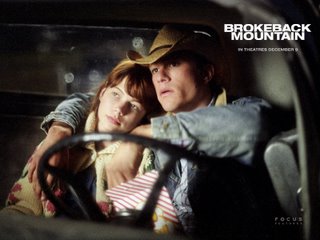SPOILERS ahoy.

(A) Alma catches a glimpse of a passionate reunion.
Soon after Ennis and Jack part ways after that lustful summer at Brokeback, Ennis quickly adjusts to life with fiance Alma. In an economical five minutes, Lee sets up a life of low-rent domestic bliss for the newlywed Del Mars -- a bliss interrupted by a postcard from Jack "Nasty" Twist. Anyone who's watched his share of what I call Love Imprisoned movies will think he know what's coming next. In such masterpieces of the genre as The Age of Innocence and Far From Heaven, the reintroduction of the verboten love interest is when the stakes are raised and the central dramatic tension comes into focus: In seeing Madame Olenska again, Newland Archer reflects on the mundane future he's set to lead with the pretty and completely conventional May Welland. When Cathy bumps into Raymond at the museum, the contrast between Raymond's thoughtfulness and the capricious pettiness of Cathy's clique is established. In those tragedies of manners, love and passion are a means of liberation from a suffocating, small-minded (yet safe and comfortable) pocket of existence. These are in a sense prison-break movies, with the spouse (or spouse-to-be) in the role of the prison warden.
Brokeback, which ultimately fits the Love Imprisoned template to a T, sets up the situation perfectly. We expect that when Ennis meets Jack again, he'll hee and haw a bit about leading a different life now, do a little cockteasing until Jack finally pins him down and reignite their passion. Alma will turn either into an insufferable nag or a needy victim but will remain completely in the dark about the true nature of Ennis and Jack's fishing expeditions until maybe the middle of the third act. The rules governing these movies dictate this kind of narrative progression.
So what actually happens? Jack and Ennis immediately fall into each other's arms (which really surprised me), but even more shocking to me was that Alma catches a glimpse of this little tryst right off the bat. Not only is this completely unexpected, Alma's knowledge of what's going on, which Lee didn't linger on, completely recalibrates the film. Instead of being merely the warden (which she still kind of was), Alma herself becomes a tragic figure. She's aware of what's going on, but suffers silently in hopes that Ennis' homoerotic passions will temper. For a brief time, the film adopts Alma's perspective as the increasingly inattentive Ennis bailed on her and their daughter for long trips with Jack. And Michelle Williams, toeing that fine line between knowing resignation and incomprehending cuckolded spouse, keeps Alma sympathetic without quite reducing her to being a mere victim of a callous husband.
Even though Love Imprisoned movies take as a subject love's powerlessness -- eros' impotence in penetrating the walls of social convention -- the truly great ones are careful not to demonize society. I imagine it's easy to give in to the temptation to turn Brokeback into a tract about how an imcomprehending, homophobic West of the 1960s can keep lovers apart. But the excellent (and underappreciated) screenplay avoids this kind of easy choice at every turn, with this Alma thread being among the most inspired. In other movies, the Alma's suffering would be treated as little more than collateral damage; here, we're shown the pain not only of the thwarted lovers, but the suffering of the "dead weight" spouses left behind.
[Second SPOILER warning -- btw, King Kong dies and the Titanic sinks.]
(B) Ennis receives word of Jack's fate from Lureen
Recall how Ennis finds out about Jack. After his mail to to his "fishing buddy" gets returned with a disturbing stamp, Ennis calls Jack's place. Lureen picks up and proceeds to tell Ennis about Jack's "accident" -- something about a tire iron hitting his face. As Ennis listens, he begins to imagine what might have really happened. We see a gruesome Matthew Shepard-type hate crime unfold. But is that what happened? Lee made sure to keep it ambiguous. The hate crime was cross-cut with Ennis' anguished visage, which makes clear that this scenario emerged from Ennis' head. And earlier, Ennis told Jack about the time his dad taking him to see the mutilated corpse of a murdered gay man. That formative image impressed itself in Ennis' psyche, which, coupled with his more conservative, unambitious temperament and his attachment to his daughter, explains Ennis' reluctance to even entertain Jack's escape to Eden pitches.

So the hate crime scenario may well exist only in the fevered imagination of a distraught and paranoid Ennis. But Anne Hathaway's clipped, suspiciously tart delivery of the news to Ennis makes one wonder. And Lureen is clearly withholding something in that conversation, but it's not clear exactly what it is. Does she know about Ennis and Jack? If so, how? The most likely explanation is that Lureen found out about Jack's homosexuality only because he was killed by a bunch of murderous homophobes. She put the two and two together and realized that Ennis the fishing buddy was his lover.
This explanation is bolstered by Ennis' trip to the Twist farm. There, Ennis meets Jack's parents, and engages in awkward conversation filled with pregnant pauses and punctuated by the father's barely concealed hostility. The two scenes here were especially good, as the parties grieve together even while Ennis and the viewer wonder whether the parents know. If the father seems a little too vocal about keeping Jack's remains on the farm (rather than sprinkled over Brokeback), it's still not entirely clear that his insistence on burial grounds isn't borne out of crusty traditionalism rather than any knowing resistance to Jack's lifestyle.
In the end, we don't know what happened to Jack. But it doesn't really matter. Not knowing makes the movie better. In these last scenes, charged with a bracing ambiguity, Brokeback Mountain undercuts the sentimentality and political positioning intrinsic to the scenario -- it's finally less a searing indictment of an intolerant society as it is a subdued, but deeply moving tale of Love Imprisoned.